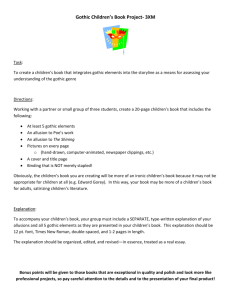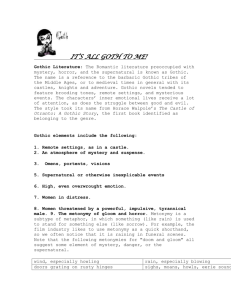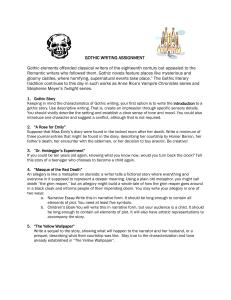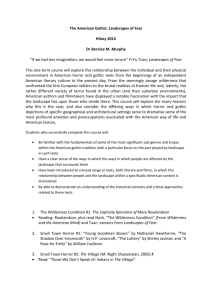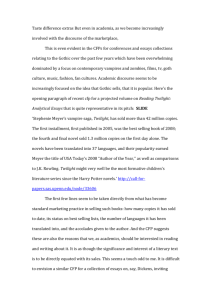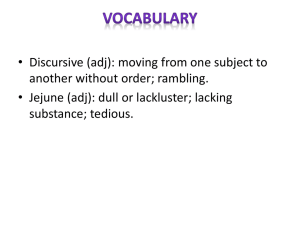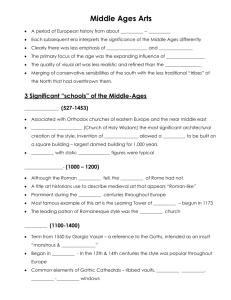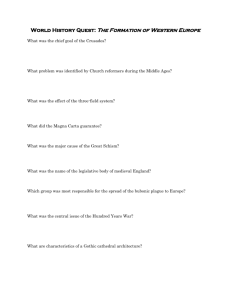Gothic Cinema
advertisement
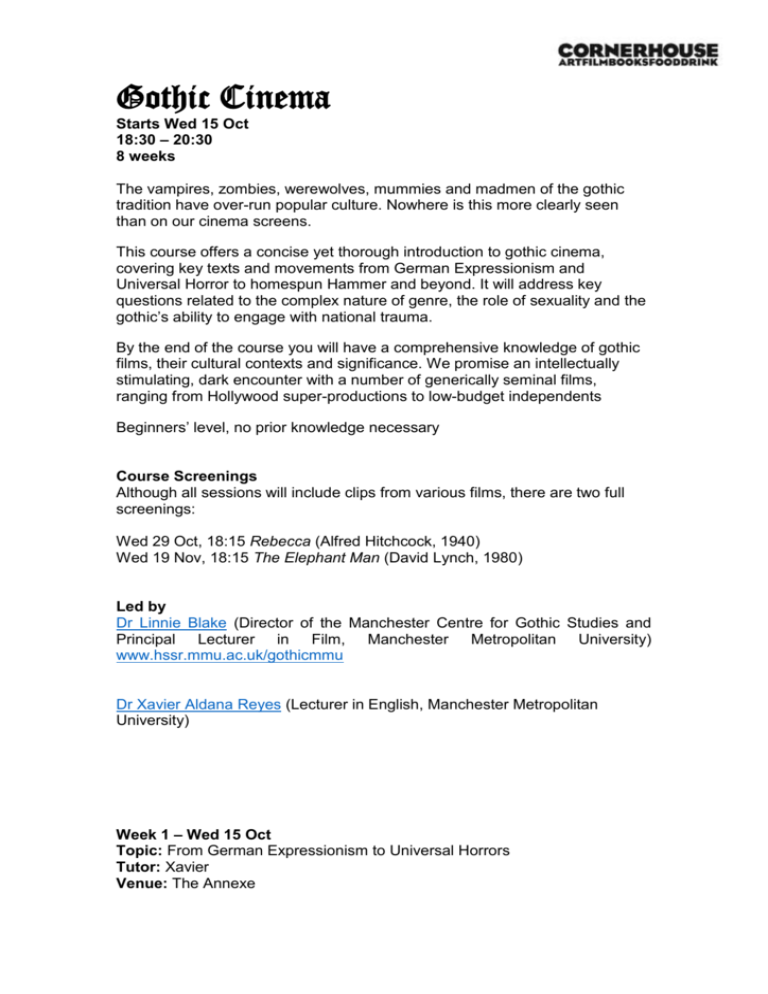
Gothic Cinema Starts Wed 15 Oct 18:30 – 20:30 8 weeks The vampires, zombies, werewolves, mummies and madmen of the gothic tradition have over-run popular culture. Nowhere is this more clearly seen than on our cinema screens. This course offers a concise yet thorough introduction to gothic cinema, covering key texts and movements from German Expressionism and Universal Horror to homespun Hammer and beyond. It will address key questions related to the complex nature of genre, the role of sexuality and the gothic’s ability to engage with national trauma. By the end of the course you will have a comprehensive knowledge of gothic films, their cultural contexts and significance. We promise an intellectually stimulating, dark encounter with a number of generically seminal films, ranging from Hollywood super-productions to low-budget independents Beginners’ level, no prior knowledge necessary Course Screenings Although all sessions will include clips from various films, there are two full screenings: Wed 29 Oct, 18:15 Rebecca (Alfred Hitchcock, 1940) Wed 19 Nov, 18:15 The Elephant Man (David Lynch, 1980) Led by Dr Linnie Blake (Director of the Manchester Centre for Gothic Studies and Principal Lecturer in Film, Manchester Metropolitan University) www.hssr.mmu.ac.uk/gothicmmu Dr Xavier Aldana Reyes (Lecturer in English, Manchester Metropolitan University) Week 1 – Wed 15 Oct Topic: From German Expressionism to Universal Horrors Tutor: Xavier Venue: The Annexe This session will introduce you to the concept of gothic cinema: how do we define it? Do we recognise it when we see it? Starting with the ‘fantastique’ trick films of Georges Méliès and moving on to the first significant adaptation of a gothic novel, Edison’s Frankenstein (1910), we will trace the important link between gothic cinema and the gothic literary tradition, and discuss its iconic aesthetics. Working our way through German Expressionism and finishing with the monsters of Universal Pictures, we will show you that the gothic has been part of filmic history from its inception and that it has consistently returned to a group of recognisable stock characters and key literary works. Films discussed in this session may include: The Haunted Castle (Méliès, 1896), Frankenstein (Edison, 1910), The Student of Prague (Heinz Ewers and Rye, 1913), The Cabinet of Dr Caligari (Wiene, 1920), Nosferatu (Murnau, 1922), Phantom of the Opera (Julian, 1925), Dr Jekyll and Mr Hyde (Mamoulian, 1931), Frankenstein (Whale, 1931), Dracula (Browning, 1931), White Zombie (Halperin, 1932), Bride of Frankenstein (Whale, 1935). Week 2 - Wed 22 Oct Topic: The British Gothic Tradition Tutor: Linnie Venue: The Annexe It has been said that, whilst the US has given the world a number of nationally specific genres, such as the Western, the British have no distinctive cinematic genre to call their own. This session takes issue with such claims, exploring the rapid evolution of the gothic genre in the 1940s and paying close attention to three classic films: Halfway House (Dearden and Cavalcanti, 1943), Dead of Night (Dearden at al., 1945) and Queen of Spades (Dickinson, 1948). It will consider the ways in which the gothic allowed contemporary audiences to engage with the trauma of war and the radical changes of the post-war period. Films discussed in this session may include: Faust and Mephistopheles (Smith, 1898), The Duality of Man (Irving, 1910), Dr Jekyll & Mr Hyde (Brenon, 1913), The Monkey’s Paw (Manning Haynes, 1923), Castle Sinister (Newman, 1932), The Ghoul (Hayes Hunter, 1933), The Clairvoyant (Elvey, 1934); The Man Who Changed His Mind (Stevenson, 1936), Sweeney Todd – the Demon Barber of Fleet Street (King, 1936), The Face at the Window (King, 1939), The Ghost Train (Forde, 1941). Week 3 - Wed 29 Oct Screening of Rebecca (Hitchcock, 1940) Venue: Cornerhouse Cinema (screen TBC) Rarely shown on the big screen, Rebecca is undoubtedly one of Hitchcock’s masterpieces. Haunting, deeply evocative and supremely directed, this adaptation of Daphne du Maurier’s gothic classic contains all the claustrophobia and erotic tension of the original. Follow the story of its main protagonist (Joan Fontaine) as she becomes the new Mrs de Winter and falls prey to Manderley’s dark spell. Week 4 – Wed 5 Nov Topic: The English Tradition Continued: Hammer / Tigon / Amicus Tutor: Xavier Venue: The Annexe This session continues our journey through British cinema by considering the highlights of the work of the Hammer, Amicus and Tigon studios. These three production companies were incredibly important for gothic film, not just because of their incredibly prolific output, but also because their success signalled a return to the unashamed genre pieces of the Universal days. We will start by focusing on Hammer and its ground-breaking films. We will look at how the films’ excesses run parallel to a loosening up of screen taboos surrounding nudity and violence. The session will consider the role of genre, its audiences and the role of horror films within the cinema industry. Films discussed in this session may include: Curse of Frankenstein (Fisher, 1957), Dracula (Fisher, 1958), Hound of the Baskervilles (Fisher, 1959), The Mummy (Fisher, 1959), Dr Terror’s House of Horrors (Francis, 1964), Witchfinder General (Reeves, 1968), The Vampire Lovers (Ward Baker, 1970), The House that Dripped Blood (Duffell, 1970), Blood on Satan’s Claw (Haggard, 1971), Tales from the Crypt (Francis, 1972), And Now the Screaming Starts (Ward Baker, 1973). Week 5 – Wed 12 Nov Topic: US Horror: 50s/60s/70s Tutor: Linnie Venue: The Annexe The years from the end of WW2 to the defeat of the US in Vietnam gave rise to a phenomenal array of films that adopted the conventions of the gothic genre to address the concerns that characterised the period. These ranged from the fear of nuclear annihilation and the threat of the communist world to the demands for civil rights by women, black people and homosexuals. Gothic (and gothic-inflected) films from the fifties to the seventies, in other words, charted the nation’s anxieties – presenting a picture of a highly troubled nation struggling with rapid social and economic change. This session will focus on a number of iconic films from the period. We will look at the SF-Gothic of Invasion of the Body Snatchers (Siegel, 1956), Roger Corman’s Poe-influenced classics like The Tomb of Ligea (1964), at the new female gothic of Rosemary’s Baby (Polanski, 1968) and Carrie (De Palma, 1976), and at the period’s classic monsters, from the zombies of Night of the Living Dead (Romero, 1968) to the demons of The Exorcist (Friedkin, 1973) and the ravening hillbillies of Texas Chainsaw Massacre (Hooper, 1975). Week 6 – Wed 19 Nov Screening of The Elephant Man (Lynch, 1980) Venue: Cornerhouse Cinema (screen TBC) Nominated for eight Oscars, David Lynch’s monochrome homage to nineteenth century urban gothic tells the tale of Joseph Merrick, a man with serious deformities exhibited as a ‘freak’ in Victorian London. With breathtaking cinematography and outstanding performances by John Hurt – supported by a range of stars from British and American cinema including John Gielgud, Anne Bancroft and Wendy Hiller – Elephant Man raises interesting questions about society’s ‘casting off’ of those perceived as different, about the human body and about the ethics of modern societies. Week 7 – Wed 26 Nov Topic: Gothic Horror 1970-2000 Tutor: Linnie Venue: The Annexe This session moves us on to the last twenty years of the twentieth century – the ‘eighties and ‘nineties. We will focus on some now-classic updates of the gothic genre to explore the ways in which each generation refashions the gothic in its own image. The highlights include: Poltergeist (Hooper, 1982), The Lost Boys (Schumacher, 1987), Jacob’s Ladder (Lyne, 1990), Bram Stoker’s Dracula (Ford Coppola, 1992) and Interview with the Vampire (Jordan, 1994). Other films discussed in this session may include: The Shining (Kubrick, 1980), An American Werewolf in London (Landis, 1981), The Fly (Cronenberg, 1986), Near Dark (Bigelow, 1987), Dead Ringers (Cronenberg, 1988), The Silence of the Lambs (Demme, 1991), Frankenstein (Branagh, 1994), From Dusk Till Dawn (Rodriguez and Kelly, 1996), The Craft (Fleming and Kaplan, 1996), The Sixth Sense (Shyamalan, 1999). Week 8 – Wed 3 Dec Topic: Contemporary Gothic Film Tutor: Xavier Venue: The Annexe This session will bring our discussion of gothic cinema right into present times. What are the benefits and limitations of labelling films gothic? Should we be talking about gothic readings of films? Working our way through the first two decades of the twenty-first century, we will consider topics such as national trauma and the horror boom, contemporary adaptations, the rise of found footage, and the profusion of vampires that already plagued the millennium before the unprecedented success of Twilight. Along the way, we will try to work out if this new gothic cinema has a distinctive flavour or whether, as some have claimed, the genre is now truly exhausted. Films discussed in this session may include: The Others (Amenábar, 2001), Underworld (Wiseman, 2003), Call of Cthulhu (Leman, 2005), Pan’s Labyrinth (del Toro, 2006), Sweeney Todd (Burton, 2007), REC (Balagueró and Plaza, 2007), Paranormal Activity (Peli, 2007), Twilight (Hardwicke, 2008), Harry Potter and the Deathly Hallows: Part I (Yates, 2010),The Wolfman (Johnston, 2010), The Monk (Moll, 2011), The Woman in Black (Goldman, 2012), Only Lovers Left Alive (Jarmusch, 2013). Further Reading Abbott, Stacey, Celluloid Vampires: Life after Death in the Modern World (Austin: University of Texas Press, 2007). Aldana Reyes, Xavier, Body Gothic: Corporeal Transgression in Contemporary Literature and Horror Film (Cardiff: University of Wales Press, 2014). Auerbach, Nina, Our Vampires, Ourselves (Chicago and London: University of Chicago Press,1995). Bell, James (ed.), Gothic: The Dark Heart of Film (London: BFI, 2013). Benshoff, Harry M., Monsters in the Closet: Homosexuality in the Horror Film (Manchester: Manchester University Press, 1997). Blake, Linnie, The Wounds of Nations: Horror Cinema, Historical Trauma and National Identity (Manchester: Manchester University Press, 2008). ---, and Xavier Aldana Reyes, Digital Horror: Haunted Technologies, Network Panic and the Found Footage Phenomenon (London: I. B. Tauris, 2015, forthcoming). Botting, Fred (ed.), Gothic, 2nd edn (1996; London: Routledge, 2013). ---, The Gothic (Cambridge: D.S. Brewer. 2000). Carroll, Noël, The Philosophy of Horror: or, Paradoxes of the Heart (London and New York: Routledge, 1990). Clover, Carol J., Men, Women, and Chain Saws: Gender in Modern Horror Film (Princeton: Princeton University Press, 1993). Creed, Barbara, The Monstrous Feminine: Film, Feminism, Psychoanalysis (London and New York: Routledge, 1993). Crow, Charles L., American Gothic (Cardiff: University of Wales Press, 2009). Egan, Kate, Trash or Treasure? Censorship and the Changing Meanings of the Video Nasties (Manchester: Manchester University Press, 2007). Forshaw, Barry, British Gothic Cinema (Basingstoke and New York: Palgrave, 2013). Freeland, Cynthia, The Naked and the Undead: Evil and the Appeal of Horror (New York: Perseus, 2002). Grant, Barry Keith (ed.), The Dread of Difference: Gender and the Horror Film (Austin: University of Texas Press, 1996.) Halberstam, Judith, Skin Shows: Gothic Horror and the Technology of Monsters (Durham and London: Duke University Press, 1995). Hills, Matt, The Pleasures of Horror (London: Continuum, 2005). Hopkins, Lisa, Screening the Gothic (Austin: University of Texas Press, 2005). Hunt, Leon, Sharon Lockyer and Milly Williamson (eds), Screening the Undead: Vampires and Zombies in Film and Television (London: I. B. Tauris, 2014). Hutchings, Peter, The Horror Film (Harlow: Longman, 2004). Jones, David J., Gothic Machine: Textualities, Pre-Cinematic Media and Film in Popular Visual Culture (Cardiff: University of Wales Press, 2011). McEvoy, Emma, and Catherine Spooner (eds), Companion to the Gothic (London: Routledge, 2008). Newman, Kim, Nightmare Movies: Horror on Screen since the 1960s (London: Bloomsbury, 2011). Peirse, Alison, After Dracula: The 1930s Horror Film (London: I. B. Tauris, 2013). Pirie, David, A New Heritage of Horror: The English Gothic Cinema (London: I. B. Tauris, 2009). Rigby, Jonathan, American Gothic: Sixty Years of Horror Cinema (London: Reynolds and Hearn, 2007). ---, English Gothic: A Century of Horror Cinema (London: Reynolds and Hearn, 2000). Sage, Victor, and Allan Lloyd-Smith, Modern Gothic: A Reader (Manchester: Manchester University Press, 1996). Skal, David J., The Monster Show: A Cultural History of Horror, rev. edn (London: Faber and Faber, 2001). Spooner, Catherine, Contemporary Gothic (London: Reaktion, 2006). Tudor, Andrew, Monsters and Mad Scientists: A Cultural History of the Horror Movie (Cambridge, MA: Willey-Blackwell, 1991). Pages of Interest and Electronic Resources: The Manchester Centre for Gothic Studies: http://www.hssr.mmu.ac.uk/gothicmmu/ Gothic Studies journal (Manchester University Press, 1362-7937; 2050-456X on-line). Horror Studies journal (Intellect, 2040-3275; 2040-3283 on-line). The Irish Journal of Gothic and Horror Studies and the Gothic Imagination (Trinity College Dublin, 2009-0374 on-line). Available at: http://irishgothichorrorjournal.homestead.com/ The Gothic Imagination website (University of Stirling): http://www.gothic.stir.ac.uk/
